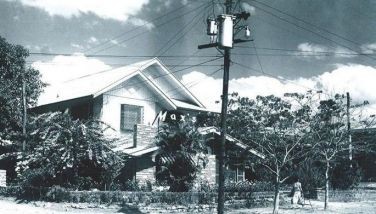‘Teka-teka’

For more than three years now, heads of government offices have seemingly adopted “teka-teka†mode. This has sort of become the order of the day for those running the various government agencies in the “Tuwid na Daan†of President Benigno “Noy†Aquino III. Typical of Filipino words that are loosely repeated, “teka-teka†means literally “wait, wait.â€
The term, however, has taken a pejorative meaning to refer to government policies, programs, and projects that take an interminably long time to get off the ground.
As used, “teka-teka†refers to putting things on “wait†mode by sending proposals or initiatives on hold for further study or review. This has become the trick employed by government officials who want to play it safe. They simply resort to “teka-teka†for any reason because they could not make hard decisions.
Thus “teka-teka†has become a national malaise among many Aquino administration officials. In fact, if there is any sign of brewing trouble, they just let P-Noy to take the hit for them.
This national malaise unfortunately afflicted most of the projects under the Public-Private Partnership (PPP) that were initially launched a few months after P-Noy’s inaugural speech in 2010. Supposedly the top priority of the administration, these PPP projects were not spared from the usual problems related to government red tape, legal troubles from right-of-way to bidding wars, etc.
What is not foreseen in P-Noy’s straight path are the obstacles or roadblocks thrown along the way. What do you do when a losing bidder, or should we say sore loser — some backed by their politician-friends — questions the implementation of approved PPP projects?
President Aquino ticked off a number PPP projects, most of which involved major infrastructure. The bulk of the projects were under the Department of Transportation and Communications (DOTC); the Department of Public Works and Highways (DPWH), and the Department of Education (DepEd).
We had thought that the newly appointed economic managers then would hit the ground running and take firm and decisive steps to fast-track these various infrastructure projects, including roads, airports and railways.
Up to now, or more than halfway through P-Noy’s term, however, we can count on the fingers of one hand the number of PPP projects that have actually laid the cornerstone, or poured the first concrete on the foundation.
The government has already awarded some of these priority infrastructure projects to the biggest names in business such as the Ayalas and Metro Pacific led by Manny V. Pangilinan. But for one reason or another, many other PPP projects are suffering endless delays.
A case in point is the Mactan-Cebu International Airport (MCIA) project. The P17.8-billion project was awarded by the DOTC to the winning bidder, GMR-Megawide, only last Friday. This is more than three months after the Filipino-Indian consortium won the open competitive international bidding for this project held in December last year.
After the usual post-bidding review, the DOTC should have already issued the notice to Megawide-GMR to proceed with implementation. By this time, if the award had been made in December, GMR-Megawide’s bulldozers and other heavy equipment would have begun work on the project already.
We’re not saying that every proposed project should be immediately approved without due diligence on firms bidding for government contracts. Every bidder should satisfy all the requirements for a particular project. This is what “Tuwid na Daan†is all about.
GMR-Megawide submitted the highest bid of P14.4 billion. The winning consortium beat six other bidders which are also big-time Filipino conglomerates with their respective foreign partners. Megawide is one of the top construction firms in the Philippines while Bangalore-based GMR Infrastructure Ltd. is the world’s third largest private airport developer in terms of passenger traffic.
Immediately after winning their bid, Megawide-GMR underwent a barrage of allegations that it should be disqualified because of reported lack of financial capability, poor track record, conflict of interest, among others.
Such serious allegations naturally raised valid concerns, especially from leaders of Cebu like Sen. Sergio Osmeña III. Acting on the Resolution filed by Osmeña, the Senate committee on public services conducted at least two public hearings that looked into these allegations. Top officials and executives of the DOTC and GMA-Megawide were invited to shed light on the issues.
At the Senate hearings, both Megawide and GMR rebutted all the allegations. Apparently, they finally managed to convince also the DOTC that they were right to award the MCIA project to their consortium. But they were unable to win over Sen. Osmeña.
On the eve before the DOTC issued the notice to proceed last Friday night, Osmeña filed before the Supreme Court a petition seeking TRO to stop the DOTC from awarding the MCIA to the winning bidders. While it may have been filed too late to stop the DOTC notice, the winning bidders are not yet out of their troubles.
Despite such troubles, Megawide remains actively involved in PPP projects. In fact, they bagged three other PPP projects, namely, the P5.7-billion new Philippine Orthopedic Center; the PPP School Infrastructure Project Phase One (PSIP-1), the PSIP-2.
The MCIA project is the biggest yet that Megawide will undertake — and the most troubled one as it turned out. Its partner GMR is likewise undeterred by these challenges. GMR is reportedly bidding in six other PPP airport projects.
Many administration projects now being implemented are in catch up mode precisely due to so much delays the investors and private contractors encounter in doing business with the government.
We could only hope and wish these private local and foreign contractors would not resort to cutting corners just to fit the timetable of completion within the remaining 812 days in office of P-Noy.
- Latest
- Trending























